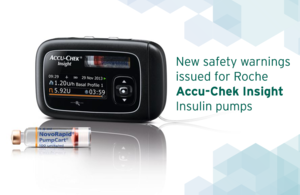New safety warnings on risk of insulin leakage from Roche Accu-Chek Insight Insulin pumps
The UK regulator has taken safety action to reduce risks associated with Roche Accu-Chek Insight Insulin Pumps by issuing a national safety alert and outlining recommendations for patients.

New safety warning issued for Roche Accu-Chek Insight Insulin pumps
The Medicines and Healthcare products Regulatory Agency (MHRA) has issued a national patient safety alert for the NovoRapid PumpCart prefilled insulin cartridge and the Roche Accu-Chek Insight Insulin pump system following concerns raised about cracked cartridges and insulin leaks.
Patients are being asked to check the pre-filled glass insulin cartridge for cracks prior to use. The cartridge should not be used if it has been dropped even if no cracks are visible. Closely follow the updated handling instructions in the pump user manual when changing pre-filled glass insulin cartridges.
The device, which releases the insulin your body needs through the day and night, comprises a pump, tube, battery and a pre-filled glass insulin cartridge. In some of the reported leakage incidents, the cartridges were found to be cracked and provided an inadequate supply of insulin to patients. However, leakages also occurred in cases where no cracks in the cartridge were visible. In some patients there were consequences of not receiving enough insulin from their pump system, including reports of severely high blood sugar and diabetic ketoacidosis (a serious complication of diabetes when the body produces high levels of blood acids called ketones).
Health care professionals are being advised to contact patients over the next six months using said device to discuss their individual needs and source an alternative pump where appropriate.
Key patient recommendations are:
- Check the pump and cartridge regularly for damages, for example cracks or leakage. If you smell insulin (a strong antiseptic chemical smell) this could also indicate a leakage.
- Do not use the cartridge if cracks or leakage are seen or if the cartridge was dropped. Follow the instructions of your Accu-Chek Insight user manual for replacing a cartridge and for cleaning the cartridge compartment in the insulin pump.
- During the day and before going to sleep please carefully check that your insulin pump is delivering insulin and there are no leakages.
- Never change treatment delivery methods without first consulting a relevant healthcare professional.
- Failure of insulin delivery due to leakage may not result in an alert notification from the insulin pump and cracks and leakages may not always be visible. You should check blood glucose levels multiple times throughout your day whilst using pumps.
- Tell your healthcare professional immediately if you suspect a problem with your insulin delivery.
Dr June Raine, Chief Executive, Medicines and Healthcare products Regulatory Agency said:
“For many patients with diabetes, insulin pumps are an important method of treatment and provide freedom and flexibility in the day to day management of their condition.
“Because of the rare risk of insulin leakage from the Roche Accu-Chek Insight Insulin Pump, patients should check the pre-filled glass insulin cartridge for any cracks prior to usage.
“We would like to reassure patients that risk of leakage remains low when used in accordance with instructions and today’s safety recommendations. Patients should continue to use their insulin pump as recommended whilst they await contact from their healthcare professional regarding an alternative device.
“If you suspect a problem with your insulin pump, please seek medical advice immediately.”
Professor Partha Kar, National Specialty Advisor, Diabetes with NHS England and co-lead of Diabetes GIRFT with NHS Improvement said:
“We are grateful to the MHRA for working closely with us on the issue of insulin pumps and any relevant safety concerns.
“We would encourage healthcare professionals to carefully review the National Patient Safety Alert and discuss with relevant patients the risks and appropriate mitigations as needed”
“We would remind patients that they should not change treatment methods without first consulting a relevant healthcare professional
Read the National Patient Safety Alert and advice for healthcare professionals here.
Notes to Editor:
- Medicines and Healthcare products Regulatory Agency (MHRA) is responsible for regulating all medicines and medical devices in the UK by ensuring they work and are acceptably safe. All our work is underpinned by robust and fact-based judgements to ensure that the benefits justify any risks.
- The MHRA is an executive agency of the Department of Health and Social Care.